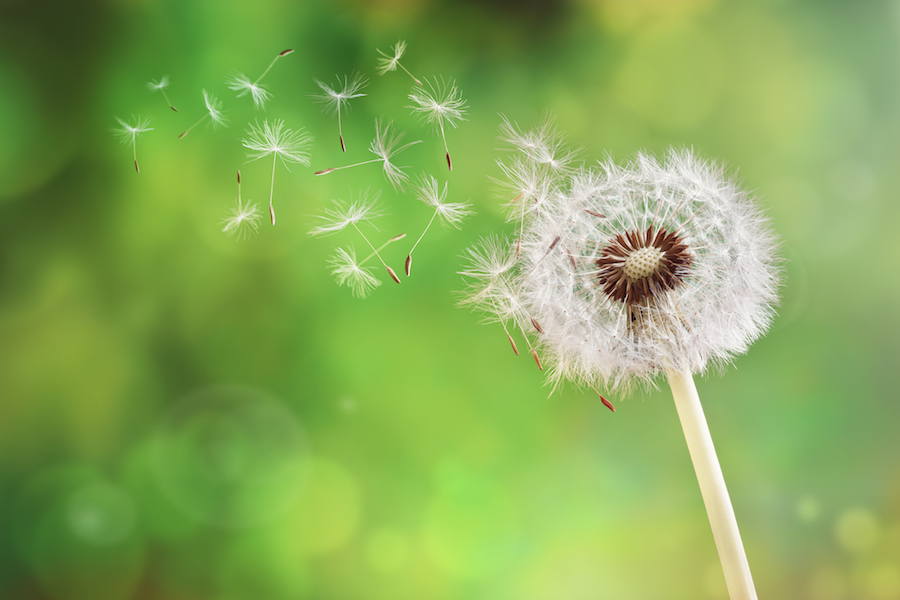10 easy ways to ease your hay fever symptoms this summer
It’s almost summer here in the UK, which means people will be starting to worry about the return of their hay fever symptoms. Also known as allergic rhinitis, this irritating condition is an allergic reaction to pollen that usually gets worse between late March and September, when its warm and humid.
It’s estimated that 40% of the population suffer from hay fever, and even with closed windows, pollen can find its way indoors and prevent people from going about their day-to-day life.

Dandelion seeds in blowing in the wind
The most common symptoms are usually caused when our bodies, in contact with the outside, produce allergic antibodies to proteins in tree and grass pollen. When pollen is inhaled, the proteins cause the antibodies to burst and release histamine. It’s this defence system that triggers the sneezing, itching, sore eyes and runny nose that many of us experience in the warmer months.
In the longer-term, symptoms can cause airways to inflame and block, resulting in poor sleep, infections or sinusitis. This can also lead to the skin around the eyes becoming swollen. The main triggers of hay fever are tree pollen, grass pollen, weed pollen and fungal spores, with grass pollen being the most common; it affects up to 90% of those who are unlucky enough to experience hay fever.
Allergic rhinitis is usually treated with anti-histamines, such as Cetirizine and Loratadine. However, there are some other non-pharmaceutical remedies that could help you feel better. Here are just a few you can try next time you get that itchy nasal feeling…
1. Give your house a good vacuum
Need an excuse for a spring clean? “Vacuuming is one of the best things you can do to reduce pollen particles indoors,” says Sara Alsén, communications director from Blueair. “Make sure your vacuum cleaner is fitted with a good filter that doesn’t re-release the pollen particles back into the air.”
She recommends buying one that uses a bag, as they’re the best at trapping dust. “Also look for one with a high-efficiency particulate air (HEPA) filter to remove at least 99.97% of ultra-small particles that can cause health problems,” she adds.

Vacuuming can help to remove pollen from your home
2. Use a wet cloth to clean surfaces and floors
Just like dust, pollen can land on surfaces and floors and remain there, unseen to the naked eye. “Instead of cleaning with a feather duster, make sure you clean all surfaces with a damp cloth or microfiber mop, which can remove smaller particles better, and ensure that you’re not just spreading them around your home,” says Alsén.
3. Leave shoes and clothing by the door
To make sure you don’t end the day with an unwelcome dose of pollen, shed your coat, shoes and clothing as you enter your home. “Pollen clings to your clothing, as well as shoes and hair,” says Alsén, “so use a mat to wipe off your shoes or, even better – leave them by the door.”
4. Shower and wash your hair after having been outside
A cold shower could be just what you need to calm your symptoms, as water blasts pollen from the body before it can irritate your nose and eyes. “During the summer months, we carry a lot of pollen into the home with us, so it’s a good idea to shower and wash your hair when you’ve been outside, as the particles can easily be brought indoors,” says Alsén.

Wash away trapped pollen from hair with a cooling shower
5. Use room air purifiers
The polluted air from outside can add to indoor pollutants that irritate our sinuses, including cigarette smoke, scented candles and stain removers. “Air purifiers remain the most efficient way to remove these airborne pollutants, helping individuals breathe healthier and relieve many allergy symptoms,” says Alsén. She recommends investing in one that uses HEPA silent technology, such as the Blueair Classic 480i (£599, breathingspace.co.uk), which can remove 99% of all pollen in a room within 20 minutes.
6. Use in-car air purifiers
While pollen tends to spend most of its time outside, it can be hard to keep it out of your car, too. “The air inside the car can be up to 15 times more polluted than on the road outside,” says Alsén, who adds: “A good air-purifier can remove the pollen inside your car in four to six minutes.”
7. Check the pollen count and adapt your daily route accordingly
Most cities in the UK provide pollen maps, such as the Pollen Forecast published by the Met Office (metoffice.gov.uk). “Mornings and breezy days are usually the worst,” says Alsén, “but this can vary from one region to another.” Pollution can worsen the effects too, so if you live in a big city, it may be a good idea to avoid being outside during rush hours.
8. Use a face mask when outdoors
Anything you can do to stop pollen getting into your nose will help stop hay fever symptoms. “Face masks are rare in the UK, but can be an effective way of filtering out pollen from the air you breathe,” says Alsén, adding: “A good face mask can make outdoor life bearable again, when pollen counts are high.”

Protect your nose with a face mask
9. Try red light therapy
Getting a good night’s sleep during the summer months could be as easy as trying a ‘nose probe’ for three minutes before bed. LloydsPharmacy have an Allergy Reliever (£14.99 – reduced from £19.99, lloydspharmacy.com) that is inserted into the nostrils to help provide relief. It works by using phototherapy of two different wavelengths. One wavelength promotes increased blood flow and circulation, while the second wavelength (red light therapy) suppresses the cells that release histamine and reduces inflammation, thereby relieving the irritating symptoms.

LloydsPharmacy Allergy Reliever
10. Use Vaseline
Got a spare pot of Vaseline at home? Get smearing… “Some people find that putting a smear inside each of your nostrils can ease soreness and stop pollen in its tracks,” says Anshu Bhimbat, a pharmacist from LloydsPharmacy.
Bhimbat adds that if your hay fever is persistent and affecting your day-to-day life, it’s advisable to seek advice and treatment from a pharmacist to alleviate the symptoms. They can recommend everything from eye drops and nasal sprays, to antihistamine tablets.
The Press Association
Latest posts by The Press Association (see all)
- Maple Cinnamon Granola - January 8, 2025
- 8 things your feet can tell you about your health - January 8, 2025
- 9 ways to look after your emotional health better in 2025 - January 7, 2025
- EastEnders fans to vote on storyline for the first time in 40th anniversary week - January 7, 2025
- Aldi beats rival Lidl as cheapest supermarket of 2024 - January 6, 2025





















